Comprehensive Guide to Garden Maintenance in Alperton
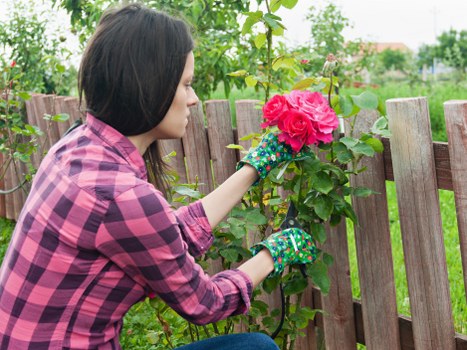
Introduction to Garden Maintenance
Maintaining a beautiful garden in Alperton requires dedication, knowledge, and the right set of tools. Whether you're a seasoned gardener or a novice, understanding the basics of garden upkeep is essential for ensuring your outdoor space flourishes throughout the year.
In Alperton, the climate and soil conditions play a significant role in garden maintenance. By tailoring your gardening practices to suit local conditions, you can achieve a vibrant and thriving garden.
Regular maintenance tasks such as pruning, weeding, and fertilizing are crucial components of successful gardening. These practices not only enhance the aesthetic appeal but also promote the health and longevity of your plants.
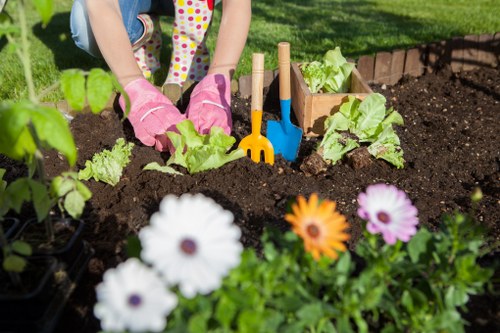
Seasonal Garden Care
Spring Maintenance
Spring is a critical time for garden maintenance in Alperton. As the weather warms, it signals the start of the growing season, making it the perfect time to prepare your garden for optimal growth.
- Soil Preparation: Enrich your soil with compost or organic matter to provide essential nutrients for your plants.
- Planting: This is the ideal time to plant flowers, vegetables, and shrubs. Choose varieties that are well-suited to Alperton's climate.
- Weeding: Removing weeds early prevents them from competing with your plants for resources.
Pruning is also essential in spring to remove dead or damaged branches, encouraging healthy new growth.
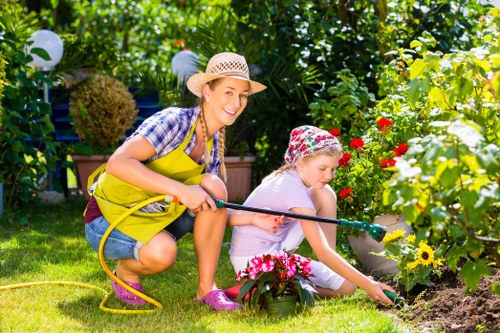
Summer Maintenance
Summer brings intense sunlight and warmer temperatures, which can stress your garden if not properly managed. Effective summer maintenance ensures your plants remain healthy and vibrant.
- Watering: Consistent watering is vital. It's best to water early in the morning to reduce evaporation and fungal growth.
- Pest Control: Monitor your garden for pests and take appropriate measures to control infestations without harming beneficial insects.
- Mulching: Applying mulch helps retain soil moisture and suppresses weed growth.
Regularly checking your plants for signs of stress or disease allows for prompt intervention, keeping your garden in top condition.
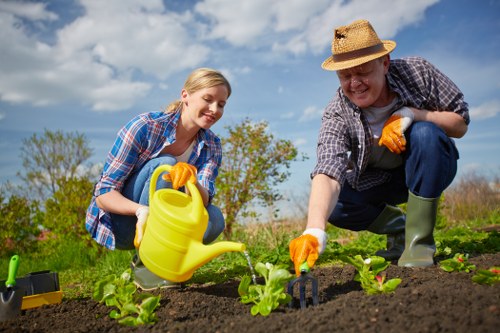
Autumn Maintenance
Autumn is the time to prepare your garden for the cooler months. Proper autumn maintenance ensures that your garden remains healthy and is ready for the next growing season.
- Leaf Removal: Clearing fallen leaves prevents them from smothering your plants and promotes better air circulation.
- Soil Amendment: Adding compost or manure enriches the soil, improving its structure and fertility for spring.
- Tool Maintenance: Cleaning and storing your gardening tools properly extends their lifespan and ensures they're ready for use next year.
Additionally, planting bulbs in autumn can lead to a spectacular spring bloom, adding color to your garden when the weather warms up again.
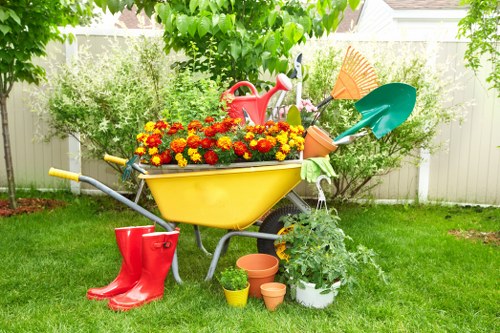
Winter Maintenance
While winter seems dormant, garden maintenance is still important to protect your plants and prepare for the upcoming year.
Protecting Plants: Use mulch or straw to insulate the soil and protect plant roots from freezing temperatures. Covering delicate plants with frost cloths can prevent damage from cold snaps.
Planning for Next Year: Winter is an excellent time to design and plan your garden layout. Consider what worked well in the past season and what changes you'd like to implement for improved results.

Essential Garden Maintenance Tasks
Pruning and Trimming
Pruning is vital for maintaining the shape and health of your plants. Regular trimming encourages new growth and removes any diseased or dead branches that could impede your garden's vitality.
Techniques: Use sharp, clean tools to make precise cuts. Always prune at the right time of year to avoid stressing your plants.
- Deadheading flowers to promote continuous blooming
- Shaping shrubs to enhance their appearance
- Removing overcrowded branches to improve air circulation
Proper pruning techniques can significantly impact the overall health and aesthetics of your garden.

Weeding
Weeds compete with your garden plants for nutrients, water, and sunlight. Effective weeding is essential to ensure your plants thrive without unnecessary competition.
Strategies: Regularly inspect your garden for weed growth and remove them promptly. Mulching can also be an effective strategy to suppress weed proliferation.
- Hand-pulling stubborn weeds
- Using natural weed killers to minimize chemical use
- Maintaining a tidy garden to discourage weed growth
Consistent weeding not only keeps your garden looking neat but also promotes healthier plant growth.

Fertilizing
Fertilizing provides your plants with the essential nutrients they need to grow strong and healthy. In Alperton, selecting the right fertilizer is crucial to match the specific needs of your garden.
- Organic Fertilizers: Compost, manure, and bone meal improve soil structure and provide slow-release nutrients.
- Chemical Fertilizers: Offer precise nutrient formulations but should be used sparingly to avoid over-fertilization.
- Liquid Fertilizers: Ideal for quick nutrient delivery, especially for container plants.
Regular fertilization, aligned with the growth cycles of your plants, supports sustained garden health and productivity.

Irrigation and Water Management
Proper irrigation is the cornerstone of effective garden maintenance. Ensuring your plants receive adequate water without overwatering is essential for their health.
Watering Techniques: Drip irrigation systems provide targeted watering, reducing water waste and minimizing leaf diseases. Alternatively, soaker hoses offer an efficient way to saturate the soil directly.
- Water early in the morning to prevent evaporation and fungal growth.
- Adjust watering schedules based on seasonal weather changes.
- Monitor soil moisture levels to determine the appropriate amount of water required.
Implementing effective water management practices conserves resources and ensures your garden remains lush and vibrant.

Choosing the Right Plants for Alperton Gardens
Selecting plant varieties that thrive in Alperton's specific climate conditions can make garden maintenance easier and more successful.
Perennials vs. Annuals
Perennials: These plants return year after year, requiring less replanting and often providing long-term structure to your garden.
- Lavender
- Hostas
- Daylilies
Annuals: These plants complete their life cycle in one season but offer vibrant, seasonal color and variety.
- Marigolds
- Petunias
- Impatiens
Balancing perennials and annuals ensures year-round beauty and reduces the maintenance workload.

Drought-Tolerant Plants
Given the variable weather patterns in Alperton, incorporating drought-tolerant plants can reduce water usage and maintenance efforts.
- Succulents
- Lavender
- Sedum
These plants are adapted to survive with minimal water, making them ideal for sustainable gardening practices.

Native Plants
Native plants are well-suited to the local environment, requiring less maintenance and providing habitat for local wildlife.
Benefits: They are more resistant to pests and diseases, reducing the need for chemical interventions.
- Bluebells
- Foxgloves
- Heather
Incorporating native species enhances biodiversity and contributes to a healthier ecosystem.

Tools and Equipment for Effective Garden Maintenance
Having the right tools is essential for efficient garden maintenance. Investing in quality equipment can make tasks easier and prolong the life of your garden.
Basic Gardening Tools
- Pruners and Shears: For precise trimming and shaping of plants.
- Spades and Shovels: Essential for digging and soil preparation.
- Gardening Gloves: Protect your hands from thorny stems and rough soil.
Maintaining your tools by cleaning and sharpening them ensures they perform effectively when needed.
Advanced Equipment
For larger gardens, advanced equipment can save time and effort.
- Lawn Mower: Keeps your lawn neat and tidy with minimal effort.
- Hedge Trimmers: Ideal for maintaining the shape of hedges and shrubs.
- Garden Tillers: Facilitate soil aeration and preparation for planting.
Choosing the right tools tailored to your garden's size and complexity enhances maintenance efficiency.

Pest and Disease Management
Managing pests and diseases is a critical aspect of garden maintenance in Alperton. Effective strategies ensure the health and productivity of your plants.
Identifying Common Pests
- Aphids: Small insects that suck sap from plants, causing wilting and distortion.
- Slugs and Snails: Feed on leaves, stems, and fruits, leaving unsightly damage.
- Spider Mites: Cause stippling and discoloration of leaves.
Early identification allows for prompt and targeted pest control measures, minimizing damage.
Organic and Chemical Controls
Organic Methods: Encourage beneficial insects, use neem oil, or introduce natural predators like ladybugs to control pest populations.
- Companion Planting: Growing certain plants together can repel pests.
- Neem Oil: A natural pesticide effective against a variety of insects.
- Bacillus Thuringiensis: A bacterial insecticide safe for beneficial insects.
Chemical Controls: Use pesticides judiciously, following label instructions to avoid harming non-target species and the environment.

Preventative Measures
Prevention is better than cure when it comes to pest and disease management. Implementing the following strategies can reduce the likelihood of infestations:
- Maintaining plant health through proper watering and fertilization.
- Removing diseased plant material promptly.
- Rotating crops to prevent soil-borne diseases.
These preventative measures create a resilient garden ecosystem, reducing the need for reactive treatments.

Lawn Care in Alperton
A well-maintained lawn is a cornerstone of any beautiful garden in Alperton. Proper lawn care enhances the overall appearance and provides a healthy environment for other plants.
Mowing
Regular mowing maintains the grass at an optimal height, promoting dense growth and preventing weed invasion.
- Frequency: Mow your lawn regularly, adjusting the frequency based on the growth rate.
- Height: Maintain grass height appropriate for the grass type to encourage healthy root development.
- Techniques: Use sharp mower blades and mow when the grass is dry for a clean cut.
Consistent mowing practices contribute to a lush and resilient lawn.

Fertilizing the Lawn
Fertilizing provides essential nutrients that promote healthy grass growth and color.
- Choosing the Right Fertilizer: Select a fertilizer suited to your grass type and soil conditions.
- Application Timing: Apply fertilizer during the growing season to maximize nutrient uptake.
- Application Methods: Use spreaders for even distribution and avoid over-fertilization to prevent runoff.
Regular fertilization ensures your lawn remains vibrant and strong throughout the year.

Weed Control in the Lawn
Weeds can disrupt the uniformity and health of your lawn. Effective weed control is essential for maintaining a pristine appearance.
Strategies: Implementing a combination of manual removal, mulching, and selective herbicide application can manage weed populations effectively.
- Hand-Pulling: Ideal for small infestations and ensures targeted weed removal.
- Mulching: Suppresses weed growth by blocking sunlight and creating a barrier.
- Selective Herbicides: Choose products that target specific weeds without harming the grass.
Maintaining a weed-free lawn requires consistent effort and the right combination of techniques.

Irrigation for a Healthy Lawn
Proper watering practices are vital for a healthy lawn. Ensuring your grass receives adequate moisture without becoming waterlogged promotes robust growth.
Watering Schedule: Water deeply but infrequently to encourage deep root growth. Early morning is the best time to water, reducing evaporation and minimizing disease risk.
- Assess Soil Moisture: Use a soil moisture meter to determine when watering is necessary.
- Adjust Based on Weather: Modify your watering schedule based on rainfall and temperature fluctuations.
- Efficient Irrigation Systems: Consider installing drip or sprinkler systems for uniform water distribution.
Effective irrigation practices conserve water and maintain a healthy, green lawn.

Hardscaping and Garden Structures
Incorporating hardscape elements and garden structures enhances the functionality and aesthetic appeal of your garden in Alperton.
Pathways and Patios
Creating pathways and patios provides structure and usability to your garden, offering spaces for relaxation and navigation.
- Materials: Choose from gravel, stone, brick, or concrete based on your design preferences and budget.
- Design: Plan pathways that complement the natural flow of your garden, integrating seamlessly with the surrounding landscape.
- Maintenance: Regularly clean and repair pathways to ensure safety and longevity.
Well-designed pathways and patios contribute to the overall harmony and functionality of your garden space.

Garden Fencing and Borders
Fencing and borders define the boundaries of your garden, adding structure and privacy while enhancing its visual appeal.
Types of Fencing: Options include wood, metal, vinyl, and natural materials like bamboo or stone.
- Privacy Fences: Provide seclusion and create a defined space.
- Decorative Fences: Enhance the aesthetic with intricate designs and patterns.
- Boundary Fences: Mark the limits of your garden, separating it from adjacent properties.
Choosing the right fencing material and style can significantly impact the look and feel of your garden.

Garden Sheds and Storage
Having a dedicated space for storing garden tools and equipment keeps your garden organized and efficient.
- Choosing a Shed: Select a shed that fits your space and storage needs, considering factors like size, material, and security features.
- Organization: Utilize shelving, hooks, and storage bins to keep tools and supplies neatly arranged.
- Accessibility: Position your shed in a convenient location, ensuring easy access while maintaining the aesthetic of your garden.
Proper storage solutions enhance the functionality and maintenance of your garden space.

Eco-Friendly Garden Practices
Adopting eco-friendly gardening practices not only benefits the environment but also promotes a healthier and more sustainable garden.
Composting
Composting transforms kitchen and garden waste into valuable organic matter, enriching your soil and reducing landfill waste.
- Setting Up a Compost Bin: Choose a suitable location and container for your compost pile.
- Balancing Materials: Mix green (nitrogen-rich) and brown (carbon-rich) materials to create a balanced compost.
- Maintenance: Regularly turn and water the compost to facilitate decomposition.
Utilizing compost improves soil fertility and structure, fostering a thriving garden ecosystem.

Rainwater Harvesting
Rainwater harvesting is an effective way to conserve water and provide a sustainable water source for your garden.
- Rain Barrels: Collect rainwater from your roof gutters into barrels for later use in irrigation.
- Irrigation Integration: Connect your rainwater harvesting system to your irrigation setup for seamless water supply.
- Water Conservation: Reduces dependence on municipal water sources and lowers water bills.
Implementing rainwater harvesting contributes to sustainable garden maintenance and environmental stewardship.

Organic Gardening
Organic gardening emphasizes natural methods to cultivate healthy plants without the use of synthetic chemicals.
Techniques: Use organic fertilizers, practice crop rotation, and employ natural pest control methods to maintain a balanced garden ecosystem.
- Crop Rotation: Prevents soil depletion and reduces pest buildup.
- Natural Pest Control: Introduce beneficial insects and use organic pesticides when necessary.
- Soil Health: Maintain soil fertility through composting and mulching.
Adopting organic practices leads to a more resilient and environmentally friendly garden.

Professional Garden Maintenance Services in Alperton
While DIY garden maintenance is rewarding, hiring professional services in Alperton can ensure your garden receives expert care and attention.
Benefits of Professional Services
- Expertise: Professionals possess the knowledge and experience to handle various gardening challenges.
- Time-Saving: Outsourcing maintenance tasks frees up your time to enjoy your garden rather than spend it working on it.
- Customized Care: Services are tailored to your garden's specific needs, ensuring optimal results.
Investing in professional garden maintenance can lead to a healthier, more beautiful outdoor space with minimal effort on your part.
Choosing the Right Service Provider
When selecting a garden maintenance service in Alperton, consider the following factors:
- Reputation: Look for companies with positive reviews and a proven track record.
- Services Offered: Ensure the provider offers the specific services you need, such as pruning, fertilizing, or pest control.
- Pricing: Compare quotes from multiple providers to find a service that fits your budget.
Choosing a reputable and reliable service ensures your garden is in capable hands.

Customized Maintenance Plans
Professional gardeners offer customized maintenance plans tailored to your garden's unique requirements.
- Assessment: They conduct a thorough assessment of your garden to identify areas needing attention.
- Planning: Develop a maintenance schedule that aligns with your garden's growth cycles and seasonal needs.
- Execution: Implement the maintenance plan, ensuring consistent care and monitoring.
Customized plans provide a structured approach to garden maintenance, ensuring all aspects are addressed effectively.
Ready to transform your garden? Contact us today and let our experts take care of all your garden maintenance needs in Alperton.

Conclusion
Effective garden maintenance in Alperton combines knowledge of local conditions, consistent care, and the right tools and techniques. Whether you choose to maintain your garden yourself or enlist professional services, understanding the essential aspects of garden upkeep will help you achieve a beautiful and thriving outdoor space.
Take the first step towards a healthier garden and book your service now to enjoy a stunning garden all year round.